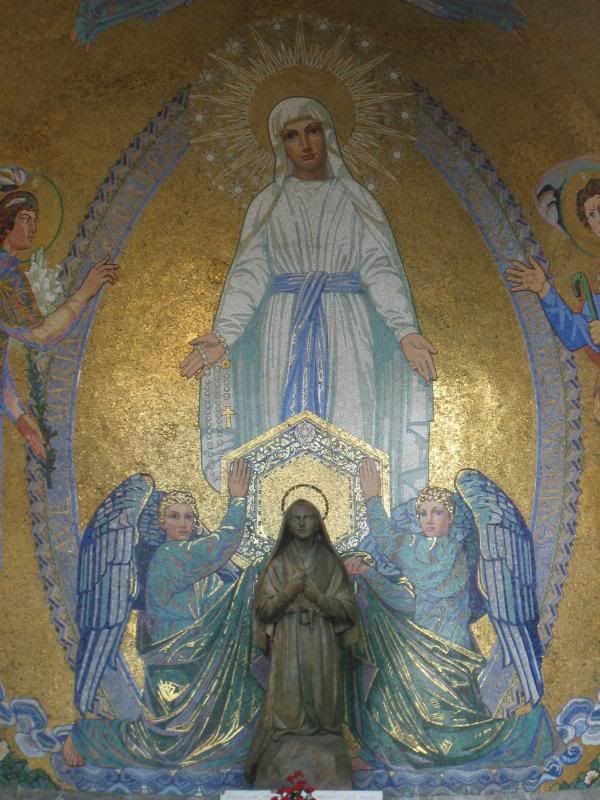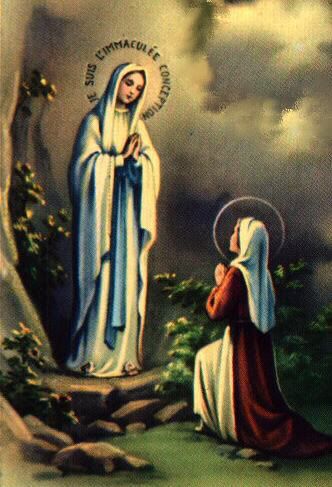Throughout the first fifteen visitations, the Blessed Virgin had brought a message of prayer, penance, poverty, and participation to all people, through the most unlikely of messengers, Bernadette Soubirous. Through these posts, we continue our journey with Saint Bernadette as we encounter Our Blessed Mother through her eyes, memories, and words. The first fifteen visitations occurred in February and March 1858 (February 11, 14, 18, 19, 20, 21, 23, 24, 25, 27, 28, and March 1, 2, 3, and 4). Our Lady of Lourdes implored us all, saying, “Penance, Penance, Penance. Pray to God for sinners.” Our Blessed Mother further invited Bernadette to drink and bathe in the muddy water of the grotto, after which a clear flowing spring came forth where none had existed before. Our Lady of Lourdes commanded, “Go drink in the spring and wash yourself there,” something that faithful pilgrims continue to do each day. (For personal reflections on my experience at Lourdes, see here, here, here, and here).
Prior to the fifteenth visitation, Bernadette’s local priest, by all accounts both brave and young, had requested that she both find out the name of the lady appearing to her, and ask her to perform a miracle—making a wild rosebush bloom during the height of winter. Bernadette had conveyed both of these requests, but the beautiful lady, the aquero, had simply smiled back. No name was given. No miracle occurred. More than 7,000 people who had gathered on March 4th were disappointed. While Bernadette didn’t return to the grotto for 20 days, many people continued to journey there, praying, and hoping for a miracle.
On the evening of March 24, as Bernadette lay in bed trying to sleep, she again felt the irresistible urge to return to the grotto. She was up before the sun, and with her parents, made her way to the grotto as Massabielle. They were surprised to find a large crowd gathered.
Bernadette prayed the Rosary in earnest, washed and drank from the spring, and kissed the ground as penance for sinners. She was again graced, for the sixteenth time, by the appearance of Our Blessed Mother. Summoning her courage, Bernadette asked the beautiful lady her name, but received no answer. She then asked three more times, each time more anxious than the last, but eager to please the local priest and authorities. On the fourth try, Bernadette inquired, “Mademoiselle, would you be good enough to tell me who you are?”
The beautiful lady smiled, and then moved her Rosary beads from her clasped hands, placing them over her right arm. She unfolded her arms, extending them toward the ground, and then raised them to fold at her breast. Raising her eyes to heaven, the beautiful lady proclaimed, “Que soy era Immaculada Councepciou.” I am the Immaculate Conception.
Our Blessed Mother spoke to Bernadette in the local dialect, but she did not know the words. Anxious that she might forget what was said, and relieved that she finally had an answer to give to Father Peyramale, Bernadette hurried to the parish church to convey the news. All the way there she repeated the words over and over out loud, to ensure that she wouldn’t forget. When she reached him, she repeated the words, “I am the Immaculate Conception.”
 Father Peyramale was astonished. He asked Bernadette what those particular words meant to her, but she just shook her head. They had no meaning. He knew that she hadn’t yet learned her catechism, and therefore understood that she had know way of knowing that the Blessed Mother was conceived without sin. Furthermore, the dogma of the Immaculate Conception had only been proclaimed four years earlier by Pope Pius IX. In his account, Father Peyramale remembers sending the child from the room, locking the door, and weeping with joy and wonderment at the fact that a poor, uneducated child had been the messenger of the Mother of God.
Father Peyramale was astonished. He asked Bernadette what those particular words meant to her, but she just shook her head. They had no meaning. He knew that she hadn’t yet learned her catechism, and therefore understood that she had know way of knowing that the Blessed Mother was conceived without sin. Furthermore, the dogma of the Immaculate Conception had only been proclaimed four years earlier by Pope Pius IX. In his account, Father Peyramale remembers sending the child from the room, locking the door, and weeping with joy and wonderment at the fact that a poor, uneducated child had been the messenger of the Mother of God.Saint Bernadette would see Our Lady of Lourdes only twice more, and she would not hear her voice again. But, through her faith, the message of Lourdes was revealed for all. She without sin reminds us to return to the word of God through poverty, penance, prayer, and participation. We embrace our poverty of spirit, not denying our gifts or talents, but acknowledging that they are precious gifts of our Lord and Savior. This leaves us open to the word of God, willing to answer His call, and advance His glory, not our own. We strengthen our hearts of prayer, finding praise and thanksgiving to the Lord in not only our quiet moments of contemplation, but in our moments of service and witness to others. We offer penance for our sin and for those of others, not just in sacrifice and acts of penance, but true conversion of heart and return to God. This penance involves remembering what the price of allowing sin into our lives is, what we lose from separation from our Lord. It also calls us to forgiveness, both of ourselves and of others. And lastly, we are moved to participation not just in pilgrimage, but as active members of our faith community, the Church. This pulls us from isolation or individual worship, and reminds us that we are members of the Church, and we share a communion with one another, with the saints who have gone before us, and with Our Blessed Mother.
O Mary, conceived without sin, pray for us who have recourse to thee.
Thou are all fair, O Mary.
And the original stain is not in thee.
Thou art the glory of Jerusalem.
Thou art the joy of Israel
Thou art the honor of our people.
Thou art the advocate of sinners, O Mary.
Virgin, most prudent, Mother, most tender, pray for us.
Intercede for us with Jesus our Lord.
In thy conception, Holy Virgin, thou wast immaculate.
Pray for us to the Father Whose Son thou didst bring forth.
O Lady! Aid my prayer. And let my cry come unto thee.
Amen
Pray for us, Our Lady of Lourdes, the Immaculate Conception.
Pray for us, Saint Bernadette.




No comments:
Post a Comment
Thanks for leaving a comment. If you wish to submit a prayer request, however, please do so above, using the "Contact" tab.